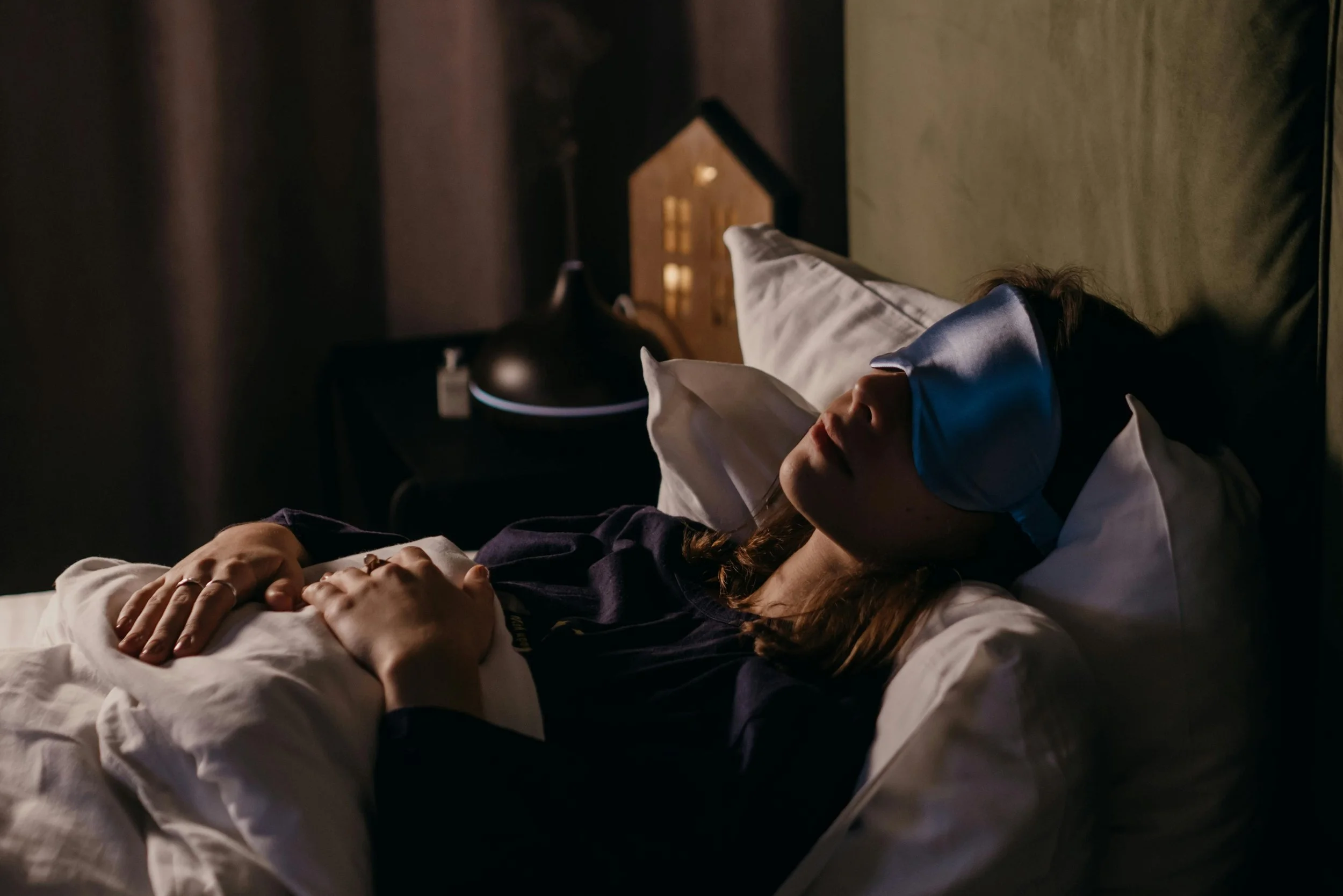Ultimate Sleep Masterclass: Best Biohacks and Proven Sleep Practices for Optimal Rest
Good sleep is a skill
And here are many tools to add to your nighttime routine toolbox!
Unlocking the Power of Sleep Biohacking: A Comprehensive Guide
In our fast-paced world, optimizing health has become a top priority for many. Enter biohacking – a revolutionary approach to achieving peak physical and mental performance through personalized lifestyle changes. But what exactly is biohacking?
Understanding Biohacking:
Biohacking revolves around optimizing health through personalized lifestyle changes. It's about taking control of your well-being and making small, measurable adjustments to achieve a peak state of mind. Often termed "do-it-yourself biology," biohacking empowers individuals to explore various technologies and techniques to enhance human performance and well-being.
Defined as optimizing health through personalized lifestyle changes.
Involves making small, measurable adjustments to achieve peak physical and mental performance.
Empowers individuals to take control of their well-being and explore innovative approaches.
The Quest for Better Sleep:
Biohacking extends its reach to improving sleep quality, a vital component of overall health and well-being. Leveraging the body's natural processes, health and wellness lovers seek to optimize sleep mechanics and circadian rhythm for enhanced restorative sleep.
Top Hacks & Tips:
Establishing a Consistent Sleep Schedule:
Go to bed and wake up at the same time every day to regulate your body's internal clock (Circadian rhythm).
Promotes better sleep quality by syncing with your body's natural sleep-wake cycle.
2. Limiting Screen Time Before Bed:
Avoid screens, including phones, tablets, computers, and TVs, at least an hour before bedtime.
Reduces exposure to blue light, which interferes with melatonin production and disrupts sleep-wake cycles.
3. Embracing Grounding Techniques:
Explore contact with the earth's surface to harness free electrons and reduce inflammation and pain.
Establish a connection with nature to promote relaxation and improve sleep quality.
4. Prioritizing Lifestyle Over Pharmaceutical Drugs:
Address lifestyle factors contributing to sleep issues before turning to drugs.
Consider natural sleep aids like chamomile, kava kava, Pharma Gaba, and valerian root for gentle relaxation and uninterrupted sleep.
Creating the Ideal Sleep Environment:
Transforming your bedroom into a sleep sanctuary is essential for optimizing restorative sleep. By prioritizing sleep and relaxation, you can create a conducive environment for peaceful slumber.
Designate the bedroom primarily for sleep and relaxation, avoiding work and entertainment.
Cultivate an atmosphere of peace and calm to signal to your body that it's time to sleep.
Invest in Blackout Curtains.
Eliminate sources of light within the bedroom to prevent disruptions to your sleep cycle.
Optimize your sleep environment by creating a dark, tranquil space conducive to restful sleep.
Use a good quality Accupressure Mat!
I highly recommend an acupressure mat for relaxation and improved sleep. Acupressure involves applying pressure to specific body points. Just a few minutes on the Sleep Induction Mat stimulates these points along your back, enhancing blood circulation and promoting deep relaxation, which can improve sleep quality and relieve tension.
How to Use:
Lie on the mat for about 10 minutes before sleep.
Relax, breathe deeply, and gradually increase your time to 30-40 minutes as you adjust.
Use it to relieve head and neck tension or massage your feet.
Initially, it may feel intense, but your body soon adjusts, leading to a euphoric sensation. I use it for 30 minutes before bed, and now it’s an immediate source of relaxation. The concept originates from traditional acupuncture techniques in Russia, China, India, and the Middle East.
There are many accupressure mats on the market that vary in price range. The one I’m currently using can be found Here! I love this one because it also comes with an accupressure pillow for the back of your neck. You can also find a cheaper mat on amazon such as this one. Be cautious with cheaper models, as their plastic pressure points may bend or deteriorate over time. I recommend choosing one with a sturdy build, as you'll likely use it frequently before bed.
Invest in a high quality Air Purifier
Air quality is crucial for optimal sleep. While you can survive three weeks without food, three days without water, you can only survive three minutes without air. Air purifiers are designed to filter 99.9% of harmful particles, including mold, dust, pet dander, and allergens, down to 0.1 microns. By ensuring cleaner air, these devices can significantly enhance your sleep quality, leading to more restful and uninterrupted nights.
Our personal favorite is the JASPR air purifier! We have a full breakdown of the JASPR Air purifier at this LINK.
Harnessing the Power of Magnesium:
Magnesium plays a vital role in stress reduction and relaxation, making it a valuable supplement for improving sleep quality and overall well-being.
Supplement with high-quality magnesium to support muscle relaxation and calm the nervous system.
Address magnesium deficiency, a common issue contributing to stress and sleep disturbances.
One of my favorite magnesium capsules is this one HERE!
My favorite topical magnesium spray with 7 minerals can be found HERE!
Aligning Sleep with Circadian Rhythms:
Optimal sleep timing enhances the restorative benefits of sleep, aligning with the body's natural circadian rhythms for enhanced rejuvenation.
Aim to sleep during the hours of 10 pm to 2 am, known as the body's "Money Time" for hormonal secretions and recovery.
Prioritize sleep alignment with natural circadian rhythms to maximize the restorative effects of sleep.
Optimizing Sleep Temperature:
Maintaining a cool sleeping environment is crucial for initiating and maintaining restful sleep, supporting the body's natural thermoregulation processes.
Keep your bedroom temperature around 68-69 degrees Fahrenheit for optimal sleep conditions.
Ensure a comfortable sleeping environment to facilitate restorative sleep and minimize sleep disturbances.
Implementing Lifestyle Changes:
Incorporating healthy habits into your daily routine can significantly improve sleep quality and overall well-being.
Establish a caffeine curfew to allow time for caffeine to metabolize and minimize sleep disturbances. (Dr. Matt Walker, a sleep expert from UC Berkeley, recommends avoiding caffeine for 12 to 14 hours before bedtime. For instance, if your usual bedtime is at 10pm, this implies refraining from consuming caffeine between 8 to 10am. For most individuals, cutting out caffeine after 2pm is ideal.)
Managing stress and relaxing through techniques like deep breathing, progressive muscle relaxation, and meditation is crucial because stress, along with elevated cortisol levels and blood pressure, can disrupt sleep.
Cut out Alcohol: It's advisable to refrain from consuming alcohol within 3 hours of bedtime as it has been shown to disrupt sleep, particularly when consumed close to bedtime. The quality of sleep following alcohol consumption tends to be significantly disturbed. Ideally, it's best to minimize alcohol intake as it is associated with various health and sleep-related issues.
It's recommended to refrain from eating within 3 hours of bedtime. Dr. Huberman highlights that consuming food earlier in the day enhances daytime alertness, raises body temperature, establishes our circadian rhythm, and shapes our subsequent days.
Workout: According to Matt Walker, engaging in regular physical activity can enhance the quality of sleep and shorten the duration it takes to fall asleep. He notes that exercising, even up to two hours before bedtime, can cut the time it takes to fall asleep in half and increase deep NREM sleep by as much as 20%.
Utilize blue light blockers and avoid screen time before bed to promote melatonin production and prepare the body for sleep. There are plenty of blue light-blocking glasses, however, THESE are my favorite.
Wear a sleep mask to block light, here are a couple of my favorites. This one is luxurious but 100% worth the price point HERE! And if you’re not looking to splurge just yet this one is also great HERE!
Maximizing Daylight Exposure:
Getting adequate sunlight exposure during the day supports melatonin production and regulates the sleep-wake cycle, enhancing overall sleep quality.
Spend time outdoors during daylight hours to support melatonin production and circadian rhythm synchronization.
Allowing bright light exposure within 30 to 60 minutes after waking can assist in regulating your body's circadian rhythm and enhancing the quality of your sleep. If possible, refrain from wearing sunglasses during this time.
Balance light exposure throughout the day to promote healthy sleep patterns and enhance overall well-being.
My favorite alarm clock that I use is this one HERE! In addition to the white noise, waterfall, and rain sound features to fall asleep to. It helps you wake up gently mimicking the sunrise and with alarms that are much less jarring than traditional alarm clocks.
The DEEP Science of sleep: This section can become a little nerdy, but it will help you really DIG DEEP on sleep.
Mastering Your Sleep Cycle: The Path to Pro-Level Sleep
Are you tired of waking up feeling groggy and unrested, despite spending what you thought was a full night in bed? Understanding your sleep cycle could be the secret ingredient to achieving a night of truly rejuvenating sleep. Let’s delve into the intricate world of sleep cycles and discover how you can leverage this knowledge to sleep like a pro.
Types of Sleep
Non-Rapid Eye Movement (NREM) Sleep: Constituting about 75% of our nightly slumber, NREM sleep is characterized by slowing brain waves and deep relaxation. It can be broken down into three distinct stages:
Stage N1: A light sleep stage where you may drift in and out of consciousness, easily awakened.
Stage N2: A deeper relaxation phase where the body's functions slow down, including heart rate.
Stage N3: Known as slow-wave sleep, this is the deepest stage where the body undergoes vital processes such as tissue repair, immune system strengthening, and memory consolidation.
Rapid Eye Movement (REM) Sleep: Accounting for roughly 25% of our sleep time, REM sleep is the phase where dreaming occurs. During REM sleep, brain activity increases, and the eyes move rapidly. Interestingly, the body is usually paralyzed during this phase to prevent physical movements that might act out dreams.
Understanding Your Circadian Rhythm
Our sleep cycle follows a predictable pattern lasting approximately 90 minutes, encompassing all stages of NREM and REM sleep. Throughout the night, individuals typically experience 4-6 of these cycles, with the duration of each stage varying. Notably, the distribution of sleep stages evolves over the course of the night, with deeper NREM sleep dominating earlier cycles and REM sleep becoming more prominent later on.
Key Insights
Understanding your sleep cycle empowers you to optimize your sleep quality and overall well-being.
NREM and REM sleep serve distinct functions crucial for physical restoration and cognitive processes.
The circadian rhythm regulates the timing and composition of sleep cycles, influencing our sleep architecture.
Prioritizing deep, restorative sleep is essential for achieving peak performance and vitality in daily life.
In essence, by acquainting ourselves with the nuances of our sleep cycle, we can proactively take charge of our sleep habits and unlock the potential for unparalleled restorative sleep. Incorporating this knowledge into our daily routines alongside healthy sleep practices can pave the way for a life filled with vitality and productivity. It’s time to elevate your sleep game and embrace the path to pro-level sleep mastery.
Unraveling Chronic Sleep Deprivation: Insights and Strategies for Overcoming Sleep Disorders
In the bustling modern world, sleep often takes a backseat to our hectic schedules and demanding lifestyles. Yet, it's crucial to recognize that sleep is not a luxury but a fundamental necessity for optimal health and well-being. Chronic sleep deprivation, characterized by consistently inadequate sleep over an extended period, can wreak havoc on both our physical and mental health. Let's explore this phenomenon and discover ways to conquer sleep disorders for a happier, healthier life.
Understanding Chronic Sleep Deprivation
Recommended Sleep Duration: While individual needs may vary, adults generally require between 7-9 hours of sleep per night to function at their best.
The Impact of Chronic Sleep Deprivation: Prolonged inadequate sleep can lead to a myriad of adverse effects on our health, including:
Increased risk of obesity, diabetes, and heart disease.
Compromised immune function, leaving us more susceptible to illnesses.
Heightened vulnerability to mood disorders like depression and anxiety.
Impaired memory, concentration, and cognitive function.
Decreased performance and productivity in daily tasks.
Elevated risk of accidents, especially while driving or operating machinery.
Distinguishing Acute vs. Chronic Sleep Deprivation
Acute Sleep Deprivation: This refers to short-term sleep loss, such as pulling an all-nighter. While it can still negatively impact health and well-being, the effects are typically less severe and transient compared to chronic sleep deprivation.
Overcoming Sleep Disorders: Strategies for Success
Prioritize Sleep: Make quality sleep a non-negotiable part of your daily routine, setting aside sufficient time for restorative rest.
Establish a Sleep-Friendly Environment: Create a conducive sleep environment by ensuring your bedroom is dark, quiet, and comfortably cool.
Practice Relaxation Techniques: Incorporate relaxation techniques such as deep breathing, meditation, or gentle stretching before bedtime to promote relaxation and prepare your body for sleep.
Limit Stimulants: Minimize consumption of caffeine and avoid stimulating activities close to bedtime to facilitate a smooth transition into sleep.
Maintain Consistent Sleep Schedule: Stick to a consistent sleep schedule, even on weekends, to regulate your body's internal clock and optimize sleep quality.
Seek Professional Help: If you're struggling with chronic sleep deprivation despite implementing lifestyle changes, consider seeking guidance from a healthcare professional or sleep specialist for personalized intervention and support.
Unlocking the Science of Sleep: Exploring Hormones and Better Sleep
Ever wondered what goes on within our bodies while we're sound asleep? The answer lies in the intricate dance of hormones orchestrating our sleep-wake cycle. Let's delve into the fascinating world of sleep hormones and how they contribute to achieving better sleep:
Melatonin: The Sleep Regulator
Role: Melatonin, often dubbed the 'sleep hormone,' is produced by the brain's pineal gland in response to darkness.
Function: It regulates our sleep-wake cycle, with levels peaking in the evening and declining in the morning.
Stimulus: Melatonin production is triggered by darkness and inhibited by light, aligning our internal clock with the natural rhythm of day and night.
Serotonin: The Mood and Sleep Balancer
Role: Serotonin, a neurotransmitter, plays a pivotal role in regulating mood, appetite, and sleep.
Conversion: It is converted into melatonin in the body, thereby promoting restful sleep.
Nickname: Often referred to as the 'happiness hormone,' serotonin's influence extends beyond sleep to overall well-being.
Growth Hormone: The Body's Repair Mechanism
Release: Growth hormones are secreted during deep sleep, peaking in the initial hours of slumber.
Function: They stimulate the production of insulin-like growth factor 1 (IGF-1), crucial for tissue repair and growth.
Benefits: Together, growth hormone and IGF-1 facilitate the repair and regeneration of bones, muscles, and other tissues, optimizing physical recovery during sleep.
Prolactin: The Multi-Functional Hormone
Release: Prolactin is released during sleep, contributing to various bodily functions.
Roles: It is involved in lactation, metabolism, and immune system regulation.
Impact: Studies suggest higher prolactin levels in individuals with obesity, potentially influencing food intake and energy expenditure.
Synergy for Better Sleep and Health
Collaboration: These hormones synergize to promote restful sleep, synchronize our sleep-wake cycle, and support overall physical and mental health.
Maintenance: By maintaining optimal levels of these hormones, we can enhance sleep quality, promote recovery, and bolster our well-being.
In essence, understanding the intricate interplay of hormones during sleep unveils the key to unlocking restorative rest and nurturing our body's natural rhythms. By harnessing the power of these sleep hormones, we pave the way for a healthier, more rejuvenated self. It's time to embrace the science of sleep and harness its transformative potential for a brighter tomorrow.
Conclusion:
By embracing the principles of sleep biohacking and implementing practical strategies to optimize sleep quality, you can unlock the transformative power of restorative sleep. Take control of your sleep health today and awaken refreshed, energized, and ready to conquer each day.
Sources:
https://www.ted.com/talks/matt_walker_sleep_is_your_superpower
https://www.humansleepscience.com/
https://www.hubermanlab.com/episode/master-your-sleep-and-be-more-alert-when-awake
https://www.hubermanlab.com/newsletter/toolkit-for-sleep




















